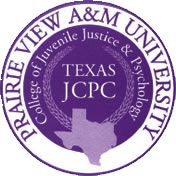 The Texas Juvenile Crime Prevention Center is committed to the reduction of juvenile delinquency and crime in the State of Texas. Through the creation of the Center and the College, Prairie View A&M University supports this mission as it strives to attain national recognition in the areas of education, research, and service in doing the following:
The Texas Juvenile Crime Prevention Center is committed to the reduction of juvenile delinquency and crime in the State of Texas. Through the creation of the Center and the College, Prairie View A&M University supports this mission as it strives to attain national recognition in the areas of education, research, and service in doing the following:
- conducting, coordinating, collecting, and evaluating research in all areas relating to juvenile crime and delinquency;
- providing a setting for educational programs relating to juvenile delinquency and crime, including degree programs at Prairie View A & M University and other educational programs such as continuing education and in-service training for criminal justice and social service professionals;
- serving as a state and national resource for information on juvenile delinquency and crime; and
- in connection with its research and educational programs:
- develop programs, policies, and strategies to address juvenile delinquency and crime and related social problems; and
- create partnerships, collaborative efforts, or outreach, public service, or technical assistance programs to assist communities, governmental agencies, or private entities to implement programs, policies, and strategies that address juvenile delinquency and crime and related social problems.
Goal
To assist in the understanding of human behavior and the reduction of juvenile delinquency and crime in the State of Texas.
Objectives
- To increase knowledge of educators, practitioners, and others by conducting research and evaluation relating to psychology and juvenile crime.
- To improve knowledge and skills of students in psychology, and criminal/juvenile justice by offering undergraduate degrees, graduate degrees; and continuing education.
- To improve dissemination of information relating to the reduction of juvenile delinquency and crime.
- To improve dissemination of knowledge pertaining to human behavior.
- To increase knowledge about programs and policies to address juvenile crime.
- To enhance skills of personnel by providing training.
- To increase knowledge of practitioners by providing assistance through collaboration and partnerships.
